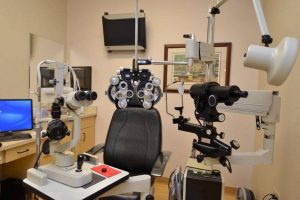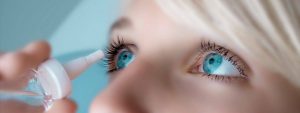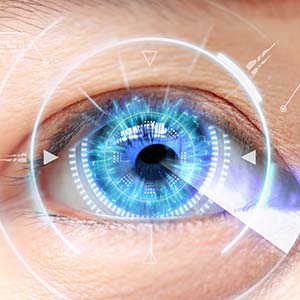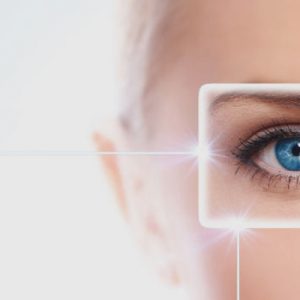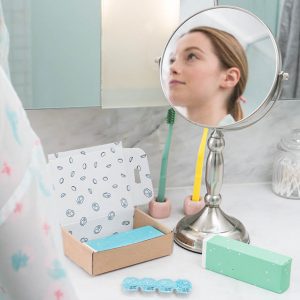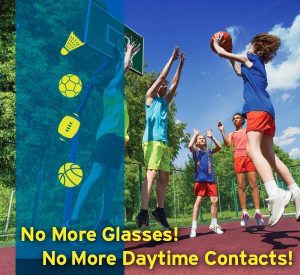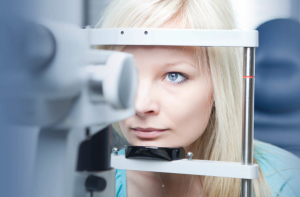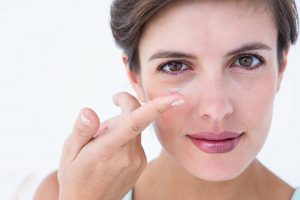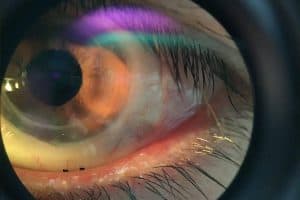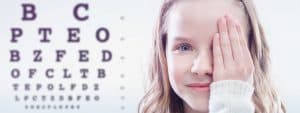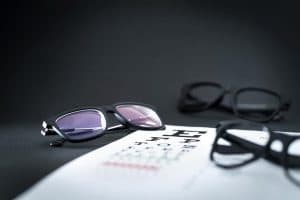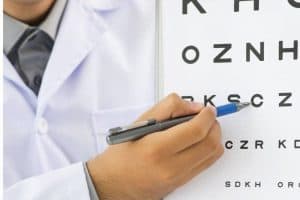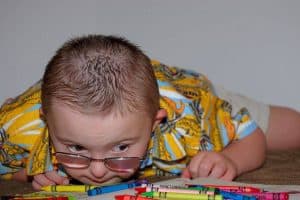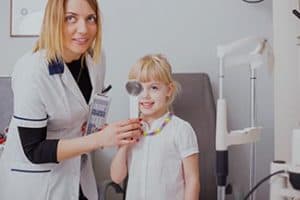Does my Baby have a Vision Problem?
Infant eye exams are essential to ensure your baby’s visual development meets their developmental milestones. Most baby’s eyes are assessed by a neonatologist within a
Read MoreChildren’s Vision: FAQs
These are the 5 most frequent questions asked to eye doctors on children’s vision. You may easily find answers to your questions below. If you still have questions, contact your nearest eye doctor experienced in children’s vision.
Read MoreHaving Difficulty Seeing at Night?
Do you find it difficult seeing while driving at night or reading in a dimly lit room? You most likely have nyctalopia, also known as night blindness.
Read MoreNearsighted or Farsighted?
Have you been told you are ‘nearsighted’ or ‘farsighted’ but not totally sure what they mean? Both of these may require you to rely on
Read MoreTop 5 Myopia Myths
Do you want to know the truth about the top 5 myopia myths? Myopia affects 1.45 billion people worldwide and is the most common refractive
Read MoreMyopia and Vision Therapy
Vision therapy not only treats lazy eye, eye turn, or learning difficulties, but may also prevent or slow the progression of myopia. While a cure
Read MoreWhat to Do Before an Eye Exam?
About to come in for your eye exam? To get the most out of your visit, start preparing with these 4 tips. If you’re experiencing
Read MoreWhen are Atropine Eye Drops Used?
Atropine is an essential eye drop used by eye doctors in both the diagnosis and treatment of many eye conditions. When you go for your
Read MoreMultifocal Contact Lenses for Children
Was your child prescribed multifocal contact lenses and you’re not sure why? Multifocal contact lenses are prescribed for children to support their learning and school
Read MoreWhy Are My Child’s Eyes Weakening?
Are you concerned your child’s eyes are weakening? Why does this happen? Children’s eyes can weaken and lenses become stronger, but should I be concerned?
Read MoreICL Surgery: What to Expect
Over 1 million ICLs have been implanted globally. An implantable collamer lens (ICL) is an artificial lens that’s permanently implanted in the eye, this surgical
Read MoreGuide to Implantable Contact Lenses
Have you been told you cannot have laser eye surgery? ICLs may be the solution. If you are considering laser vision correction surgery, an implantable contact lens (ICL) could be an option to provide you with the best vision.
Read MoreLASIK Eye Surgery: 5 Myths and Facts
Here’s the most common myths and facts on laser eye surgery. While LASIK eye surgery has become the most popular refractive surgery in the U.S, there are many misconceptions regarding this procedure that prevent people from even discussing LASIK with their eye doctors.
Read MoreContact Lenses for Astigmatism
Approximately 1 in 3 people have astigmatism, a vision condition that causes blurry and distorted vision. If you have astigmatism, there is a wide variety
Read MoreWhat Is a Macular Hole?
Macular holes affect up to 4 in 1,000 people above the age of 55. Early detection of a macular hole can reduce your risk of
Read MoreHelp! My Child Dislikes Online Learning
The current COVID-19 pandemic has children learning through digital platforms for up to 7-10 hours a day! But what can you do when your child
Read MoreNear Point Visual Stress (NPVS)
Modern science now understands why long hours of reading and screen time can lead to eye strain. When the visual system struggles to meet the
Read MoreWhat’s Worse: High Myopia or Smoking?
Smoking can lead to the development of sight-threatening eye diseases — but did you know that myopia can also increase your risk of these serious
Read MoreMyopia Management for Athletes
Rarely do you think about your eyes when preparing for a big game… until your glasses slip off your face or your contact lenses pop
Read MoreHow Does Ortho-K Work?
Ortho-k lenses are designed to float on top of the eye’s tear film and apply gentle water-based (hydraulic) pressure to the front layer of the cornea, called the epithelium. The hydraulic pressure causes the cells of the epithelium to move from the center of the cornea to the periphery. This migration of corneal cells leads to a temporary reshaping of the cornea and correction of the refractive error.
Read MoreOrtho-K: Top 10 FAQs
Orthokeratology (ortho-k) is quickly becoming the gold standard for myopia management in children. Here are the top 10 most frequently asked questions about ortho-k to help you decide if this myopia management technique is right for you.
Read MoreThe Benefits of Outdoor Play for Children with Myopia
Not only does spending time outdoors have significant health benefits, it can even help to slow down myopia progression in children. Myopia, more commonly known
Read MoreShould I Be Worried About Myopia?
Myopia (nearsightedness) progression in children doesn’t only result in needing stronger glasses, but also leads to serious sight-threatening eye conditions. Below are the most common
Read MoreCan Your Child Benefit from Myopia Management?
According to studies, myopia management has shown to reduce myopia progression by up to 78%. Myopia management is a treatment program that involves multifocal glasses or contact lenses, overnight ortho-k lenses, MiSight lenses, or specialized eye drops— all scientifically proven to reduce the rate of myopia progression and the risk of future eye diseases associated with myopia.
Read MoreMiSight Lenses for Myopia Management
MiSight contact lenses are daily disposable, soft contact lenses designed to control myopia progression in children ages 8 to 15 years. Although FDA approval is for children up to age 12, recent research has found that teens up to age 15 can also benefit from these lenses.
Read MoreAre Ortho-K Lenses Safe?
Ortho-k lenses are designed to reshape your cornea while you sleep, so you can benefit from clear vision during the day— without the need for glasses or contact lenses. These specialized lenses are prescribed to control the rate of myopia progression in children, as well as for vision correction without the need for daytime eyewear. The question is, are they safe?
Read MoreWhy Do Adults Choose Ortho-K?
If you have been thinking about ways to improve your vision without the need for corrective eyewear, ortho-k may be the solution you have been searching for
Read MoreGuide to High-Index Lenses
High-index lenses are eyeglass lenses that are designed to be thinner and lighter than regular lenses. They are generally recommended for people who have significantly high refractive errors and strong prescriptions for nearsightedness, farsightedness, or astigmatism.
Read MoreImprove Your Sight, Improve Your Life
Believe it or not, the coronavirus pandemic may have brought about a number of positive changes in many people’s lives. The COVID-19 pandemic arrived at
Read MoreNight Blindness: Treatments and Prevention
Night blindness (nyctalopia) affects vision clarity in low light conditions and can significantly impact performance of daily activities. Night blindness, despite its name, does not
Read MoreWhat Causes Night Blindness?
Night blindness (nyctalopia) causes reduced vision in low light conditions, and can be a source of fear and anxiety for those affected by it. Decreased
Read MoreThe Contact Lens Exam
Over 22 percent of people who wear eyeglasses enjoy the benefits of also using contact lenses. If you are thinking about contact lenses, a contact
Read MoreGuide to Hard Contact Lenses
While soft contact lenses have become quite popular in recent years, hard contact lenses are actually preferred by many people with specific vision conditions
Read MoreGuide to Soft Contact Lenses
Approximately 90 percent of contact lens wearers prefer soft contact lenses. There are many different options when it comes to soft contact lenses. While your optometrist can help you to narrow down your choices— usually dependent on your prescription and personal lifestyle, it is important to be aware of the advantages and disadvantages of each type of lens
Read MoreVision Therapy: Glossary of Terms
Have you heard some terms from friends, family or even your eye doctor, that you are not sure what they mean? Here is a guide
Read MoreKeratoconus
What is keratoconus? Keratoconus is a progressive disease that causes thinning and reshaping of the cornea, the front part of your eye. In a healthy
Read More8 Tips to Protect Your Child’s Vision
Visual health is crucial for all aspects of life – seeing, learning, and connecting with others. Follow these tips to protect your child’s eyes and developing vision, to give them a life-time of clear vision, good eye health and the best opportunity to succeed in school and the sports field.
Read MoreMyopia Management FAQs
Q1: What is myopia? A: Myopia is a refractive error, or a vision condition that affects the ability to see distant images or objects clearly.
Read MoreCorneal Dystrophies
Corneal conditions can permantly impact your vision. The cornea is the clear, protective outer layer of the eye. It’s primary function is to act as
Read MoreWhat Are Contact Lenses?
Contact lenses are designed to cover the cornea, the clear covering of the eye. They stay in place by adhering to the tear film of the eye, and through the pressure from the eyelids. When you blink, your eyelid glides over the contact lens, enabling a cleansing and lubricating action to keep the contact lens comfortable on the cornea.
Read MoreWhat is Myopia Management?
Myopia management has shown to decrease myopia progression by up to 78%. Myopia management is a treatment program to keep the level of myopia as low as possible, and reduce your risk of developing a serious sight-threatening eye disease. Myopia management can involve the use of eyeglasses, contact lenses, and eye drops— all scientifically proven to aid in the control of myopia progression.
Read MoreWhat is Laser Refractive Surgery?
Are you thinking of having laser eye surgery? Laser eye surgery, also called laser refractive surgery, is a common procedure that is performed to eliminate the need for eye wear— both glasses and contact lenses. Up to 98 percent of patients achieve 20/20 vision with laser eye surgery.
Read MoreGuide to Bifocals and Multifocals
Have you noticed the need to hold your phone, books or restaurant menus farther from your eyes to improve their clarity? Presbyopia is the most common reason most adults begin to wear eyeglasses. The condition generally develops overtime, beginning at around age 40, and is considered a normal part of the aging process.
Read MoreOptical Lenses
In recent years, the transition from glass to plastic lenses has revolutionized the way we see. In the past, eyeglass lenses were made of glass. However, in recent years, lenses have transitioned to a durable plastic, that is lighter in weight, and less prone to breaking— providing a more comfortable experience.
Read MoreOptical Frames
Shopping for eyeglass frames can be quite overwhelming… but also lots of fun! Eyeglasses nowadays come in a variety of styles, shapes, colors, and materials— metal, plastic, and even natural wood. Optical stores are filled with rows and rows of frames, manufactured by popular brands and designers to suit every taste and unique fashion sense.
Read MoreVision Therapy for ADD
Vision Therapy for ADHD Has your child been diagnosed with ADHD, but continues to suffer from reading and attention issues? Does your have eye tracking
Read MoreWhy Is My Child’s Myopia Worsening?
Are you concerned that your child needs stronger eyeglasses? Myopia is not only blurry vision but can also lead to serious sight-threatening eye diseases. Myopia
Read MoreMultifocal Designs for Children
Your eye doctor may have prescribed multifocal lenses for your child, but are multifocals only for adults? Multifocal lenses are generally prescribed for adults who have blurry near vision, and complain of reading difficulties due to lack of vision clarity, however eye doctors are also prescribing these lenses for children.
Read MoreWhat Is Myopia?
Myopia affects clarity of vision for any distant images and objects – the board in a classroom, driving, the television, a clock on the wall, etc. Myopia affects millions of children and adults, worldwide, over 30% of the U.S. population suffers from myopia.
Read MoreWhy Is Myopia Management Important?
Is there a way to prevent my child’s myopia from worsening? A number of recent studies suggest that it may be possible to control myopia by totally stopping, or at least slowing down, its progression during childhood and teenage years. Myopia management is a treatment program aimed at controlling myopia, keeping the level of myopia as low as possible, in order to reduce your child’s risk of developing vision threatening eye diseases later in life.
Read MoreEye Drops For Children
What are eye drops used for in children? Your eye doctor may have used eye drops during the eye exam of your child or may have prescribed eye drops for their use. Eye drops are commonly administered or prescribed by eye doctors for children.
Read MoreAre School Vision Screenings Reliable?
Many schools conduct vision screenings as a service to try to identify vision problems, but are they reliable? The simple answer is, no. These vision screenings are very limited, and are not a substitute for a comprehensive eye examination performed by an eye doctor.
Read MoreShould I See an Optometrist or Ophthalmologist?
Your eye care team Ophthalmologists, optometrists and opticians are the three main professionals included on the ‘eye care team’. While each profession plays an important
Read MoreVision and Down Syndrome
The frequency of Down Syndrome (DS) is approximately 1 in every 800 births, with an increased frequency among older mothers. With the specialized improvements in the quality of eye care individuals with DS can live a more productive, longer life. Individuals with Down Syndrome (DS) are at a higher risk for a range of vision conditions that may affect the development of their visual skills.
Read MoreEye Exams for Children
Eye doctors utilize specific clinical and diagnostic tools and assessments to determine your child’s eye health and visual abilities. Since many learning skills are dependent on the strength of visual skills such as binocular vision, accurate eye movements, the ability to see distant objects, etc., doctors recommend that children have their first eye exam at age 6 months.
Read MorePrimary Eye Care
Home > Primary Eye Care Primary Eye Care Why are regular eye exams important? Can eye disease be prevented? What are the signs and symptoms
Read More





